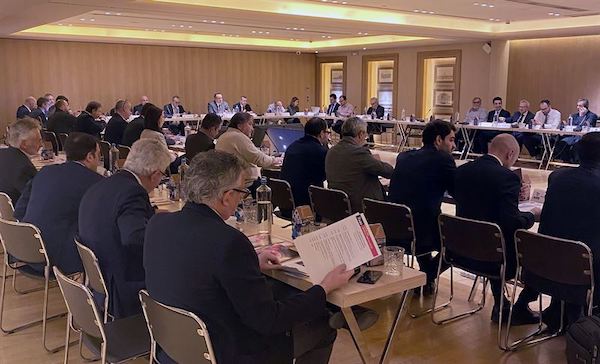Greek shipping industry leaders came together to discuss the latest advances in maritime technologies such as nuclear power, air lubrication and remote survey services at the annual ABS Hellenic Technical Committee Meeting.
The event also provided an ideal opportunity to introduce ABS’ latest publication, Technology Trends: Exploring the Future of Maritime Innovation. In the report, ABS offers an executive glimpse into the future of advanced marine and offshore technologies, laying out a vision and timeline for key technological milestones on the journey to net-zero emissions and digitalization.
“Innovation in the maritime industry is cyclical, and we’re on the verge of a new wave of technologies and change,” said Patrick Ryan, ABS Senior Vice President, Global Engineering and Technology. “Guided by close collaboration with industry leaders here in Athens and beyond, and our own understanding of the market, ABS is able to share where we think these technologies are going.
Ryan was invited to speak to the members about nuclear power and its opportunity to support the maritime industry.
“ABS classed the first U.S. flag commercial nuclear vessel 60 years ago. Today, nuclear power is being studied as a possible low-to-zero emission power source for vessels, and ABS is supporting this technology with a sharp focus on safety. The possible applications in today’s environment are fascinating,” said Ryan.
Takis Pappas from Silverstream provided a look into the latest advances with air lubrication technologies that promise to support lower operational expenses and improved transportation efficiencies.
Guest speaker María Mercedes De Juan Muñoyerro from the Innovation and Port Cluster Development Technical Team at the Port of Valencia focused on the opportunities and challenges associated with decarbonization in the shipping industry.
Lambros Nakos, Executive Director at Hydrus Engineering S.A. joined ABS’ Konstantinos Voutzoulidis to present information on the NH3CRAFT Consortium, a multidisciplinary group composed of 12 partners from six countries within the European Union that aims to develop a next generation sustainable, commercially attractive and safe technology for high-volume storage and transportation of ammonia as fuel on-board ships.
“Close collaboration with industry leaders is key to understanding the market, and committee meetings such as these are very important for ABS to connect and continue the dialogue about trending technologies. I am thankful to all the attendees and guest speakers for providing another robust session,” said Dr. Chris Leontopoulos, ABS Committee Chair and Director of the Global Ship Systems Center.
“It is always a pleasure to attend the ABS Hellenic Technical Committee meeting with a variety of the most interesting contemporary technical topics, varying from presentations on decarbonization and remote surveys to lively conversations about ‘spare parts’,” said Miltos Zisis, Committee Member and Managing Director of Capital Gas Ship Management Corp.






